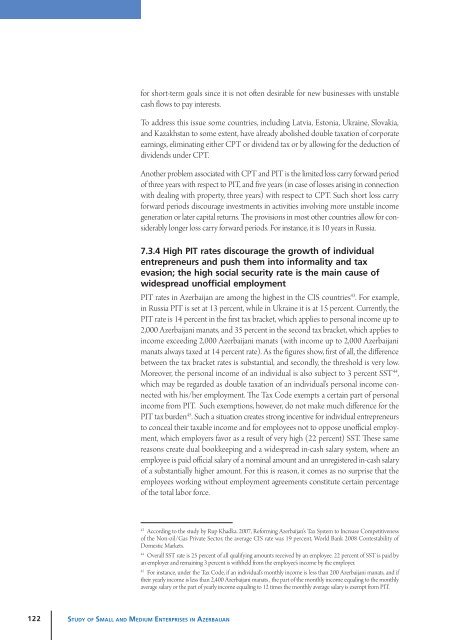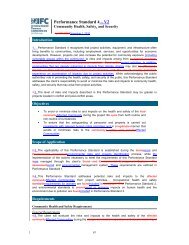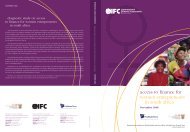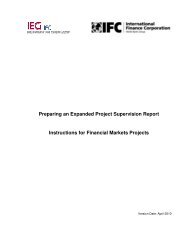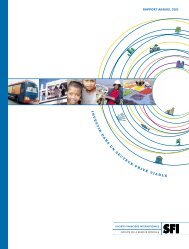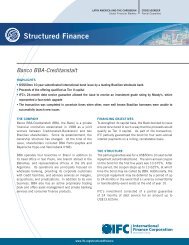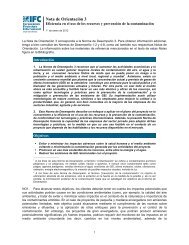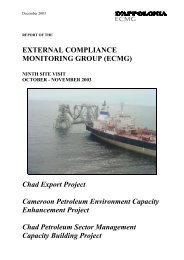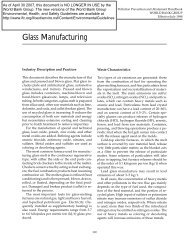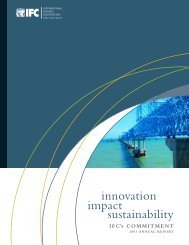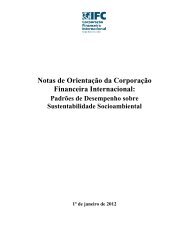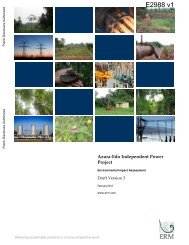Study of Small and Medium Enterprises in Azerbaijan - IFC
Study of Small and Medium Enterprises in Azerbaijan - IFC
Study of Small and Medium Enterprises in Azerbaijan - IFC
Create successful ePaper yourself
Turn your PDF publications into a flip-book with our unique Google optimized e-Paper software.
for short-term goals s<strong>in</strong>ce it is not <strong>of</strong>ten desirable for new bus<strong>in</strong>esses with unstable<br />
cash flows to pay <strong>in</strong>terests.<br />
To address this issue some countries, <strong>in</strong>clud<strong>in</strong>g Latvia, Estonia, Ukra<strong>in</strong>e, Slovakia,<br />
<strong>and</strong> Kazakhstan to some extent, have already abolished double taxation <strong>of</strong> corporate<br />
earn<strong>in</strong>gs, elim<strong>in</strong>at<strong>in</strong>g either CPT or dividend tax or by allow<strong>in</strong>g for the deduction <strong>of</strong><br />
dividends under CPT.<br />
Another problem associated with CPT <strong>and</strong> PIT is the limited loss carry forward period<br />
<strong>of</strong> three years with respect to PIT, <strong>and</strong> five years (<strong>in</strong> case <strong>of</strong> losses aris<strong>in</strong>g <strong>in</strong> connection<br />
with deal<strong>in</strong>g with property, three years) with respect to CPT. Such short loss carry<br />
forward periods discourage <strong>in</strong>vestments <strong>in</strong> activities <strong>in</strong>volv<strong>in</strong>g more unstable <strong>in</strong>come<br />
generation or later capital returns. The provisions <strong>in</strong> most other countries allow for considerably<br />
longer loss carry forward periods. For <strong>in</strong>stance, it is 10 years <strong>in</strong> Russia.<br />
7.3.4 High PIT rates discourage the growth <strong>of</strong> <strong>in</strong>dividual<br />
entrepreneurs <strong>and</strong> push them <strong>in</strong>to <strong>in</strong>formality <strong>and</strong> tax<br />
evasion; the high social security rate is the ma<strong>in</strong> cause <strong>of</strong><br />
widespread un<strong>of</strong>ficial employment<br />
PIT rates <strong>in</strong> <strong>Azerbaijan</strong> are among the highest <strong>in</strong> the CIS countries 43 . For example,<br />
<strong>in</strong> Russia PIT is set at 13 percent, while <strong>in</strong> Ukra<strong>in</strong>e it is at 15 percent. Currently, the<br />
PIT rate is 14 percent <strong>in</strong> the first tax bracket, which applies to personal <strong>in</strong>come up to<br />
2,000 <strong>Azerbaijan</strong>i manats, <strong>and</strong> 35 percent <strong>in</strong> the second tax bracket, which applies to<br />
<strong>in</strong>come exceed<strong>in</strong>g 2,000 <strong>Azerbaijan</strong>i manats (with <strong>in</strong>come up to 2,000 <strong>Azerbaijan</strong>i<br />
manats always taxed at 14 percent rate). As the figures show, first <strong>of</strong> all, the difference<br />
between the tax bracket rates is substantial, <strong>and</strong> secondly, the threshold is very low.<br />
Moreover, the personal <strong>in</strong>come <strong>of</strong> an <strong>in</strong>dividual is also subject to 3 percent SST 44 ,<br />
which may be regarded as double taxation <strong>of</strong> an <strong>in</strong>dividual’s personal <strong>in</strong>come connected<br />
with his/her employment. The Tax Code exempts a certa<strong>in</strong> part <strong>of</strong> personal<br />
<strong>in</strong>come from PIT. Such exemptions, however, do not make much difference for the<br />
PIT tax burden 45 . Such a situation creates strong <strong>in</strong>centive for <strong>in</strong>dividual entrepreneurs<br />
to conceal their taxable <strong>in</strong>come <strong>and</strong> for employees not to oppose un<strong>of</strong>ficial employment,<br />
which employers favor as a result <strong>of</strong> very high (22 percent) SST. These same<br />
reasons create dual bookkeep<strong>in</strong>g <strong>and</strong> a widespread <strong>in</strong>-cash salary system, where an<br />
employee is paid <strong>of</strong>ficial salary <strong>of</strong> a nom<strong>in</strong>al amount <strong>and</strong> an unregistered <strong>in</strong>-cash salary<br />
<strong>of</strong> a substantially higher amount. For this is reason, it comes as no surprise that the<br />
employees work<strong>in</strong>g without employment agreements constitute certa<strong>in</strong> percentage<br />
<strong>of</strong> the total labor force.<br />
43<br />
Accord<strong>in</strong>g to the study by Rup Khadka. 2007, Reform<strong>in</strong>g <strong>Azerbaijan</strong>’s Tax System to Increase Competitiveness<br />
<strong>of</strong> the Non-oil/Gas Private Sector, the average CIS rate was 19 percent, World Bank 2008 Contestability <strong>of</strong><br />
Domestic Markets.<br />
44<br />
Overall SST rate is 25 percent <strong>of</strong> all qualify<strong>in</strong>g amounts received by an employee. 22 percent <strong>of</strong> SST is paid by<br />
an employer <strong>and</strong> rema<strong>in</strong><strong>in</strong>g 3 percent is withheld from the employee’s <strong>in</strong>come by the employer.<br />
45<br />
For <strong>in</strong>stance, under the Tax Code, if an <strong>in</strong>dividual’s monthly <strong>in</strong>come is less than 200 <strong>Azerbaijan</strong>i manats, <strong>and</strong> if<br />
their yearly <strong>in</strong>come is less than 2,400 <strong>Azerbaijan</strong>i manats , the part <strong>of</strong> the monthly <strong>in</strong>come equal<strong>in</strong>g to the monthly<br />
average salary or the part <strong>of</strong> yearly <strong>in</strong>come equal<strong>in</strong>g to 12 times the monthly average salary is exempt from PIT.<br />
122<br />
St u d y o f Sma l l a n d Me d i u m Ent e r p r i s es <strong>in</strong> Az e r b a i j a n


